人教版七年级下册英语4单元复习资料
人教版七年级下册英语unit4知识点+经典练习题

人教版七年级下册英语unit4知识点+经典练习题人教版七年级下册英语unit4 知识点+经典练习题Unit4.Don’t run in the hall way!One:重点词组1.class rules班规;school rules校规;a lot of/lots of rules许多规则;make rules制定规则;follow the rules遵守规则;wear schol uniforms穿校服;wear a hat戴帽子;listen to(the music\the tape)听音乐/听磁带;watch the video/DVD/VCD.观看---;eat in the dinning hall在餐厅吃饭;fight with others与别人打架;run in the hall way在大厅过道跑步;2.arrive late for class上课迟到;be late for class上课迟到;be late for school上学迟到;be quiet安静的;be noisy吵闹的;make the /your bed整理床铺;talk aloud/loudly大声交谈;make much noise大声喧哗;relax yourself放松你自己;3. Too many/too much太多;on school nights在学校的晚上;make dinner做饭;on time准时;Have to---必须,不得不;Two:重点句型1. don’t +v! 请不要---(否定祈使句)(1)Please don’t run in the hall way!请别在大厅过道跑步!(2)Don’t fight with others,please.请不要和别人打架!(3)Don’t make much noise吵杂声at the library!别在图书馆发出吵闹声!(4)Don’t talk aloud/loudly in class!请别在课堂上大声交谈!(5)Don’t listen to music in class!请别在课堂上听音乐!(6)Don’t eat in the classroom,plea se!请别在教室吃东西!(7)Please don’t arrive late for class\school!上学/课请不要迟到!Please don’t be l ate for class/school.(8)Tom,please don’t read in bed!(9)Don’t be noisy!请不要吵闹!(10)Please be quiet!请保持安静!2.-What are the rules?/-We must be on time for class.3.-What are the school rules?有哪些校规啊?-What are the class rules?有哪些班规啊?4.What do you have to do?你一定得做什么啊?5.-Can we (eat in the clsssroom/wear a hat in class)?我们必须---吗?6.-Do you have to get to school before 8am?-Does she have to wear a uniform at school?7(1)There are lots of things to do.There are lots of things you can do.你有许多事情可以做(2)They make rules to help us,we have to follow these rules.(3)You should listen to music to relax yourself.你应当听音乐来放松一下你自己。
人教版七年级下册英语Unit 4复习资料(包含答案)
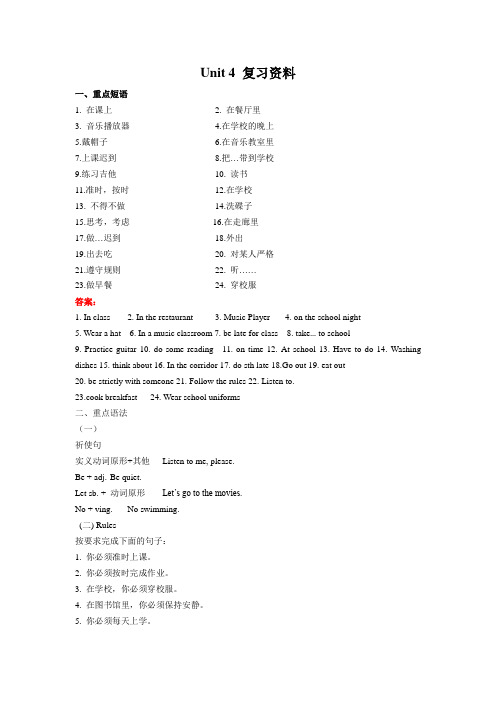
Unit 4 复习资料一、重点短语1. 在课上________________2. 在餐厅里_________________3. 音乐播放器________________4.在学校的晚上_________________5.戴帽子_________________6.在音乐教室里________________7.上课迟到_________________ 8.把…带到学校________________9.练习吉他________________ 10. 读书________________11.准时,按时_______________ 12.在学校_______________13. 不得不做________________ 14.洗碟子_________________15.思考,考虑________________ 16.在走廊里________________17.做…迟到_________________ 18.外出________________19.出去吃________________ 20. 对某人严格________________21.遵守规则________________ 22. 听…… ________________23.做早餐_______________ 24. 穿校服________________答案:1. In class2. In the restaurant3. Music Player4. on the school night5. Wear a hat6. In a music classroom7. be late for class8. take… to school9. Practice guitar 10. do some reading 11. on time 12. At school 13. Have to do 14. Washing dishes 15. think about 16. In the corridor 17. do sth late 18.Go out 19. eat out20. be strictly with someone 21. Follow the rules 22. Listen to.23.cook breakfast 24. Wear school uniforms二、重点语法(一)祈使句实义动词原形+其他Listen to me, please.Be + adj. Be quiet.Let sb. + 动词原形Let’s go to the movies.No + ving. No swimming.(二) Rules按要求完成下面的句子:1. 你必须准时上课。
人教版七级下英语Unit 4 Dont eat in class单元知识复习总结
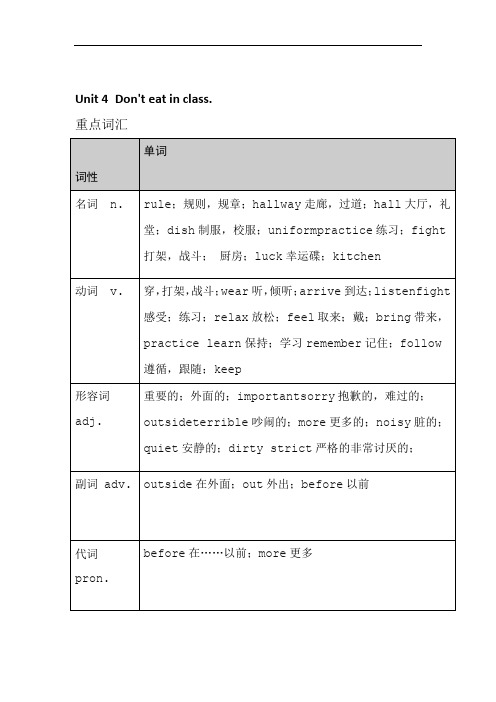
Unit 4Don't eat in class. 重点词汇重点短语Section A1.in class在课堂上2.arrive late for class=be late for class上课迟到3.on time准时4.in the hallways在走廊里5.in the dining hall在餐厅里6.listen to听7.at school在学校8.be late迟到9.music player音乐播放器10.bring...to school 把……带到学校来不得不做have to do.11.12.wear a school uniform穿校服13.be quiet安静Section B14.go out外出15.on school nights在上学期间的晚上16.practice the guitar练吉他17.do the dishes清洗餐具18.make breakfast做早饭19.make one's bed整理床铺20.leave sth.in...把……丢在……里21.read a book看书22.think about考虑23.make rules制订规则24.follow the rules遵守规则25.Good luck!祝好运!26.keep sth.+adj.使……保持……状态重点句型1.Don't eat in class.在课堂上不准吃东西。
2.Don't arrive late for class.You must be on time.不准上课迟到,务必守时。
3.Don't run in the hallways.不准在走廊内乱跑。
4.Don't eat in the classroom.You must in the dining hall.不准在教室里吃东西,务必在餐厅里吃东西。
5.Don't listen to music in class.不准在课堂上听音乐。
人教版七年级下Unit 4 ---6同步考点复习
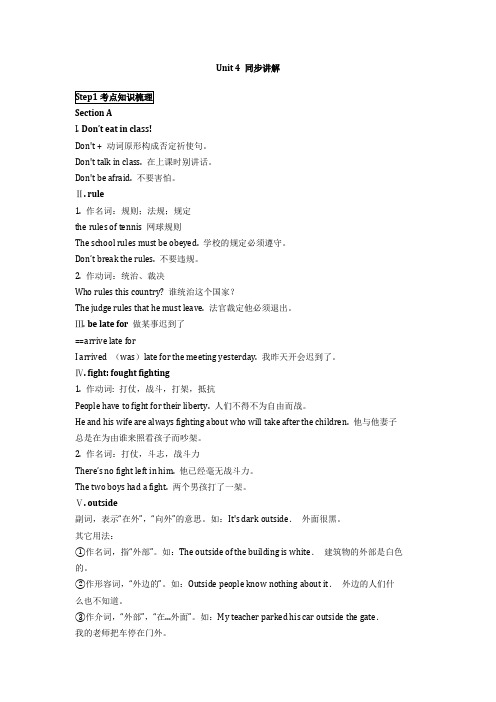
Unit 4 同步讲解Section AI. Don’t eat in class!Don't + 动词原形构成否定祈使句。
Don't talk in class. 在上课时别讲话。
Don't be afraid. 不要害怕。
Ⅱ. rule1. 作名词:规则;法规;规定the rules of tennis 网球规则The school rules must be obeyed. 学校的规定必须遵守。
Don’t break the rules. 不要违规。
2. 作动词:统治、裁决Who rules this country? 谁统治这个国家?The judge rules that he must leave. 法官裁定他必须退出。
Ⅲ. be late for 做某事迟到了==arrive late forI arrived (was)late for the meeting yesterday. 我昨天开会迟到了。
Ⅳ. fight: fought fighting1. 作动词: 打仗,战斗,打架,抵抗People have to fight for their liberty. 人们不得不为自由而战。
He and his wife are always fighting about who will take after the children. 他与他妻子总是在为由谁来照看孩子而吵架。
2. 作名词:打仗,斗志,战斗力There’s no fight left in him. 他已经毫无战斗力。
The two boys had a fight. 两个男孩打了一架。
Ⅴ. outside副词,表示“在外”,“向外”的意思。
如:It's dark outside.外面很黑。
其它用法:①作名词,指“外部”。
如:The outside of the building is white.建筑物的外部是白色的。
人教版英语七年级下册Unit4Don’teatinclass.知识点及课后作业
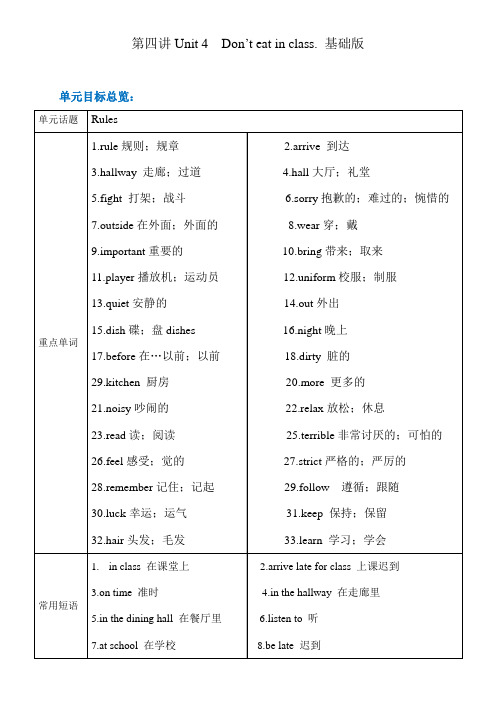
第四讲Unit 4 Don’t eat in class. 基础版单元目标总览:【知识点详解】1、Don’t arrive late for class.上课不要迟到。
1)arrive 意为“到达”。
arrive at+小地点,arrive in +大地点。
◆I will arrive in Beijing next week. 我下周到北京。
◆I arrived at the small village on a cold morning. 在一个寒冷的早晨我到达了那个小村庄。
2)arrive 后面跟地点副词here, there, home时,不需要跟介词。
◆arrive home 到家arrive here 到这儿2、You must be on time.你必须准时。
(1)on time&in timeon time 意为“按时,准时”,指按照规定的时间或者指定的时间做某事;而in time指“及时”,指不迟到或在规定的时间之前或者接近所规定的时间做某事。
◆We must arrive there on time. 我们必须按时到达那里。
At last, the police arrived there in time. 最后警察及时赶到了那里。
(2)must情态动词,意为“必须”,不能单独做谓语,必须和动词原形以其构成谓语;其后接动词原形;其否定形式mustn’t意为“禁止,千万不要”◆I must do my homework before dinner.晚饭前我必须做完作业。
3、Don’t listen to music in class.不要再课堂上听音乐。
(1)listen 是不及物动词,意为“听,倾听”,强调听的动作,后面接宾语时要加上介词to。
◆We should listen to the teacher carefully. 我们应该认真听老师讲课。
◆Listen! Someone is singing in the garden. 听! 有人在花园里唱歌。
(完整版)人教版英语七年级下册第四单元短语语法知识点总结及练习

(完整版)人教版英语七年级下册第四单元短语语法知识点总结及练习Unit 4Don’t eat in class【短语归纳】1.on time 准时,按时2. listen to …听……3. in class 在课上4. be late for 做……迟到5. have to 不得不6. be quiet安静7. go out外出8. do the dishes 清洗餐具9. make breakfast 做早饭10. make (one’s) bed 铺床11. be noisy 吵闹12. keep one’s hair short 留短发13. play with sb. 和某人一起玩14. play the piano 弹钢琴15. have fun 玩得高兴16. make rules 制订规则【用法集萃】1.Don’t + 动词原形+其他,不要做某事。
2.help sb. (to) do sth. 帮助某人做某事3.too many + 可数名词复数太多的……4.practice doing sth. 练习做某事5. be strict with sb. 对某人要求严格6. be strict in sth. 对某事要要求严格7. leave sth sp. 把某物忘在某地8. keep + 宾语+形容词使……保持某种状态9. learn to do sth. 学会做某事10. have to do sth. 不得不做某事┃语法探究┃┃.祈使句定义:用于表达命令、请求、劝告、警告、禁止等的句子叫__________句。
时态:使用______________时态。
结构:动词原形+其他成分+please. 否定祈使句在动词原形前面加__________ 。
如:Be quiet in the classroom, please.在教室里请保持安静。
Don't fight. 不要打架┃.情态动词have to 和must1.情态动词have to和must都表示“__________”的意思。
人教版丨七年级下册英语Unit4单词,知识梳理,词汇句式精讲
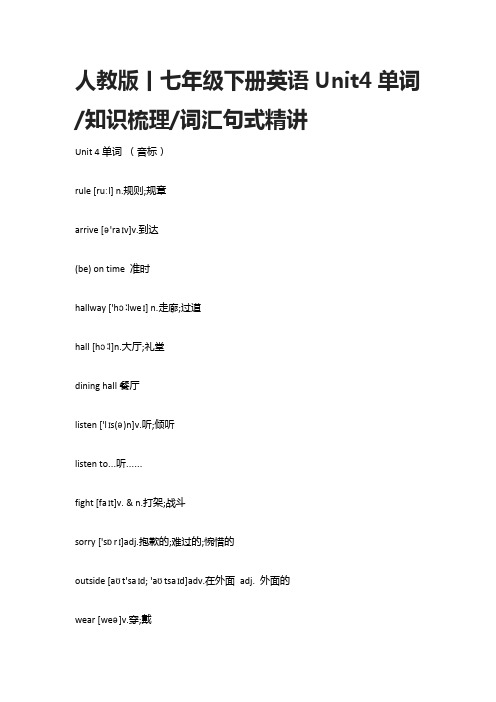
人教版丨七年级下册英语Unit4单词/知识梳理/词汇句式精讲Unit 4单词(音标)rule [ruːl] n.规则;规章arrive [ə'raɪv]v.到达(be) on time 准时hallway ['hɔːlweɪ] n.走廊;过道hall [hɔːl]n.大厅;礼堂dining hall餐厅listen ['lɪs(ə)n]v.听;倾听listen to…听……fight [faɪt]v. & n.打架;战斗sorry ['sɒrɪ]adj.抱歉的;难过的;惋惜的outside [aʊt'saɪd; 'aʊtsaɪd]adv.在外面adj. 外面的wear [weə]v.穿;戴important [ɪm'pɔːt(ə)nt]adj.重要的bring [brɪŋ]v.带来;取来uniform ['juːnɪfɔːm]n.校服;制服quiet ['kwaɪət]adj.安静的out [aʊt]adv.外出go out 外出(娱乐)practice ['præktɪs]v. & n.练习dish [dɪʃ]n.碟;盘do the dishes清洗餐具before [bɪ'fɔː]prep. & conj.在…以前adv.以前make (one’s) bed铺床dirty ['dɜːtɪ]adj.脏的kitchen ['kɪtʃɪn]n.厨房more [mɔː]adj. & pron.更多的noisy ['nɒɪzɪ]adj.吵闹的relax [rɪ'læks]v.放松;休息read [riːd]v.读;阅读terrible ['terɪb(ə)l]adj.非常讨厌的;可怕的feel [fiːl]v.感受;觉的strict [strɪkt]adj.严格的;严厉的be strict (with sb)(对某人)要求严格remember [rɪ'membə] v.记住;记起follow ['fɒləʊ]v.遵循;跟随follow the rules遵守规则luck [lʌk] n.幸运;运气keep [kiːp] v.保持;保留hair [heə] n.头发;毛发learn [lɜːn] v. 学习;学会Clark [kla:k]克拉克(姓;男名)Amy [eɪmɪ]埃米(女名)Molly['mɒlɪ]莫莉(女名)New York [nju: jɔ:k]纽约unit4课本教材人教版丨七年级下册英语Unit4单词/知识梳理/词汇句式精讲!人教版丨七年级下册英语Unit4单词/知识梳理/词汇句式精讲!人教版丨七年级下册英语Unit4单词/知识梳理/词汇句式精讲!人教版丨七年级下册英语Unit4单词/知识梳理/词汇句式精讲!人教版丨七年级下册英语Unit4单词/知识梳理/词汇句式精讲!◆短语归纳1. on time 准时,按时2. listen to…听……3. in class 在课上4. be late for 做……迟到5. have to 不得不6. be quiet 安静7. go out 外出8. do the dishes 清洗餐具9. make breakfast 做早饭10. make (one’s) bed 铺床11. be noisy 吵闹12. keep one’s hair short 留短发13. play with sb. 和某人一起玩14. play the piano 弹钢琴15. have fun 玩得高兴16. make rules 制订规则◆用法集萃1. Don’t + 动词原形+其他。
人教版七年级英语下册第四单元知识点总结

人教版七年级英语下册第四单元知识点总结本文总结了人教版七年级英语下册第四单元的主要知识点。
1. Unit 4单词- 普通名词:动物(animals)、狗(dog)、猫(cat)、鸟(bird)、兔子(rabbit)等。
- 动词:看(look)、听(listen)、读(read)、写(write)、跳(jump)等。
- 形容词:高(tall)、矮(short)、粗(fat)、瘦(thin)等。
- 介词:在...上(on)、在...下面(under)、在...旁边(next to)等。
2. Unit 4句型- What animals do you like?(你喜欢什么动物?)- I like cats.(我喜欢猫。
)- What does Gina look like?(吉娜长得什么样?)- She is tall and thin.(她高又瘦。
)- What can rabbits do?(兔子会做什么?)- Rabbits can jump high.(兔子能跳得很高。
)3. Unit 4语法- 一般现在时:表示经常性的行为或惯。
- I like dogs.(我喜欢狗。
)- She looks like her mother.(她长得像她妈妈。
)- 持续性动词:表示持续性或正在进行的动作。
- I am reading a book.(我正在读一本书。
)- Look! The cat is sleeping.(看!那只猫在睡觉。
)4. Unit 4交际用语- 问答交流:- -- What animals do you like? -- I like dogs.(-- 你喜欢什么动物? -- 我喜欢狗。
)- -- What does Jane look like? -- She is short and fat. (-- Jane长得怎么样? -- 她又矮又胖。
)- 描述交流:- Look! It's a bird.(看!这是只鸟。
- 1、下载文档前请自行甄别文档内容的完整性,平台不提供额外的编辑、内容补充、找答案等附加服务。
- 2、"仅部分预览"的文档,不可在线预览部分如存在完整性等问题,可反馈申请退款(可完整预览的文档不适用该条件!)。
- 3、如文档侵犯您的权益,请联系客服反馈,我们会尽快为您处理(人工客服工作时间:9:00-18:30)。
4单元知识点一、重点语法 1. 祈使句(Imperative Sentence ) 定义:用于表达命令、请求、劝告、警告、禁止等的句子叫做祈使句,祈使句最常用于表达命令,因此在学校文法中也常称为命令句。
祈使句因对象(即主语)是第二人称,所以通常都省略。
祈使句的动词都为一般现在时,句末则使用句号或感叹号来表示结束。
祈使句的肯定句:行为动词原形+其他 Eg:Go and wash your hands.去洗你的手。
——命令 Be quiet, please.= Please be quiet.请安静。
No parking.禁止停车。
——禁止 以Let 开头的祈使句,Let 后宾语是是第一人称时,否定形式是在宾语后加not, Eg:Let ’s not do that again.我们别再那样做了。
如果Let 后面宾语是第三人称,否定形式是在Let 前加助动词Don ’t, Eg:Don ’t let them come in.别让他们进来。
祈使句的否定通常使用“Don't …”,Don't+动词原形(行为动词/be 动词)+其他 Eg:Don't let the dog in.不要让那只狗进来。
祈使句有时也把主语“You”表达出来,使对方听起来觉得柔和些,例如: Eg:You go and tell him, Chris.克立斯你去告诉他。
2.情态动词have to 的用法: 意思是"必须、不得不"它侧重于客观上的必要和外界的权威。
结构:主语+have to+动词原形+其他一般现在时:主语是第三人称单数时用has to ,其它时候用have to (过去时:无论人称和单复数都用had to.) Eg:We have to wear sneakers for gym class. 在体育课上我们必须穿运动鞋。
Tom has to practice the guitar every day. 汤姆每天必须练习弹吉它。
否定形式:主语+don't have to+动词原形+其他,注意,don’t hav e to =needn ’t 一般现在时:主语是第三人称单数时用doesn't have to,其它时候用don't have to. (过去时: 无论人称和单复数都用didn't have to) Eg:Nick doesn't have to wear a uniform. 尼克不必穿制服。
We didn't have to do our homework at once. 我们不必马上完成作业。
疑问句:Do 、Does 或Did+主语+have to +动词原形+其他 Eg:---Do you have to stay at home on weekends?周末你必须呆在家里吗 ---Yes, I do. / No, I don't. 是的我必须。
不我不必。
Did he have to go to bed by 11:00 last night? 昨晚他不得不11点前上床睡觉吗? 3..情态动词must 的用法: must 表示说话人的主观看法,及主观上的必要性,还用于命令或愿望。
只用于现在时,无人称和单数的变化。
在表示过去、将来和完成时,用have to 的相应形式来代替must. 在表示有做某一个动作的必要和义务,它的意思是“必须,应该”。
Eg:You must finish your homework fist.你必须先完成作业。
表示有很大把握的判断或者推测,意思是“一定,准是”。
Eg:The tall man must be your father.那个高个子男人一定是你的爸爸。
以must 开头的一般疑问句,它的否定回答用needn ’t (不必要),不用mustn ’t (不允许),mustn ’t 常用于否定句中表示“不允许,禁止”。
Eg:---Must I go there on foot?我必须得走过去吗? ---No,you needn ’t.不,你不需要。
You mustn ’t park your car here.你的车不允许停在这儿。
注意:have to 与must 的区别 have to 着重于客观的需要,含有不得不的客观强制性; must 着重于主观上自己认为有义务,有必要. She has to clean the classroom every week. I must go now. 二、重点知识辨析 1. arrive late for= be late for 做某事迟到。
arrive late for 侧重到达的时间晚,be late for 侧重于状态。
Don’t arrive late for the meeting next time= Don ’t be arrive late forthe meeting next time 下次开会别迟到 2.辨析: get to/reach/arrive 相同点:都是“到达“的意思 不同点:get to+地点;reach+地点 arrive at+小地点(车站等);arrive in+大地点(国家等) 注意:get to 与地点副词(here/there/home …)不用介词to Eg: I want to go to Beijing. I got home at 15:00.我下午三点到的家。
arrive 是不及物动词,后面若接地点名词则要和in/at 连用,接地点副词时则不用介词。
Eg: I arrived home at 15:00. =I got home at 15:00. He arrived in Shanghai yesterday.他昨天到的上海。
He arrived yesterday.他昨天到的。
reach 是及物动词,后面直接接地点名词或副词。
Eg:When will they reach here? 3.hear 、listen 和sound 都有"听"的意思,但三者是有区别的:hear"听说"侧重于"听"的内容。
Eg:I'm sorry to hear that you are ill. 听说你生病了我很难过。
I never heard such an interesting story. 我从来没听过这么有趣的一个故事。
listen"听"侧重于"听"这一动作。
Eg:Listen to me carefully. 认真听我说。
The children like to listen to music. 孩子们喜欢听音乐。
sound"听起来"它是系动词后面接形容词等。
Eg:That sounds great. 那听起来真不错。
It sounds like fun. 听起来挺有趣。
4. strict 是形容词,意为 “严格的”; “严厉的”,通常与be 动词连用。
be strict with sb “对某人严厉” Eg:Mr. White is very strict with us. 怀特先生对我们要求很严格。
We should be strict with ourselves. 我们应该对自己要求严格。
be strict in (doing) sth “对某事要求严格”Eg:Our boss is strict in our work. 我们的老板对我们的工作要求严格。
5.remember “记得,记住”,是及物动词,可以直接加名词。
remember doing sth 记得已做某事(已做) Eg:I remember seeing him once.我记得见过他一次。
remember to do sth 记得要做某事(还没做)Eg:Remember to post the letter for me.记得给我寄这封信。
forget “忘记,忘了”,作remember 反义词时,用法和remember 相同。
6.too mang,too much 与much too 易混词组 意义及用法 例句 too many 形容词,“太,太多”,接可数名词 There are too many people in the park. too much 形容词,“太多”,接不可数名词 I have too much homework today. much too 副词,“太,非常”,接形容词或副词 My mother is much too busy. 7.辨析:in class,in the class 与in the classroom 1. in class “在课堂上,上课时”,与after class (课后)相对。
in the class 表示“在这个班上”。
There are 45students in the class. in the classroom 表示“在教室里”,与outside the classroom 相对。
When we are in the classroom,we should keep quiet.保持安静。
2. 拓展:类似短语at table 在进餐 at the table 在餐桌旁 in bed 在睡觉 in the bed 在床上at school 在读书、在上学 at/in the school 在那所学校 go to school 去上学 go to the school 去学校 8. bring 是指“带来、领来、取来、送去”。
(从别处往说话人这里拿) 1. bring sth to +地点 把某物带到某地 Bring your friend to the party. 请带你的朋友来参加聚会。
2. fetch 是指“去拿来”,指“去”了又“来”。
Can you _____(拿来)me a book? 3. take 是指 “拿走、取走”。
(指从说话人这里往别处拿) _____ the letter ____the post office. 把这封信送到邮局去。
9.some of... 指“....中的一些”Some of + U 作主语为三单主语 Some of the chicken ___bad. Some of + C 复数,作主语为复数主语 10.relax1. relax vt. “放松, 休息,使轻松”,三单________ This song______ me. 这首歌使我心情舒畅。
